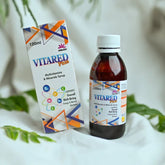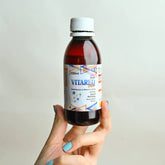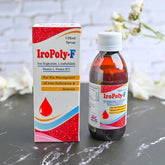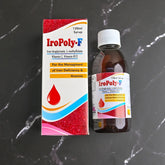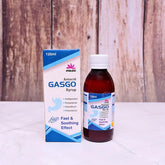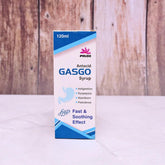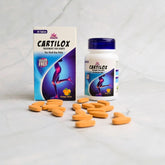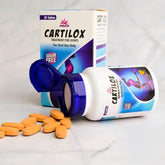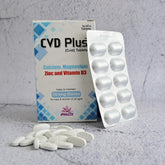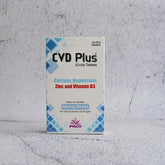Introduction
What comes to mind when you hear bone health? For most, the response is easy: milk. From childhood commercials to word of mouth from family, we've been instructed that a daily glass of milk ensures sturdy bones for life.
In reality, bone strength and joint health depend on far more than just dairy. Nutrients, lifestyle habits, supplements, and even exercise routines play a significant role in preventing conditions such as osteoporosis, arthritis, and early bone weakening.
In this comprehensive guide, we’ll bust the most common bone health myths, explain what science actually says, and explore modern solutions, including advanced bone & joint supplements.
Myth 1: “Milk Builds Strong Bones. That’s All You Need”
For decades, milk has been marketed as the ultimate bone builder because it contains calcium and vitamin D. While this is partly true, the idea that milk alone prevents fractures and osteoporosis.
The Truth:
-
Studies show that countries with lower milk consumption (like Pakistan) often have lower fracture rates compared to Western nations.
-
This difference is linked to dietary diversity (leafy greens, fish, legumes) and active lifestyles, not just dairy intake.
-
Bone health depends on multiple nutrients, including magnesium, vitamin K2, collagen, and protein are just as critical.
Myth 2: “Dairy Is the Only Source of Calcium”
Calcium is the mineral most people associate with bone strength. But assuming dairy is the only way to get it is one of the biggest bone health myths.
The Truth:
-
Non-dairy calcium sources include tofu, almonds, sesame seeds, chickpeas, fortified plant milks, and green vegetables like kale and bok choy.
-
Some vegetables (like spinach) contain calcium but also oxalates, which reduce absorption. That’s why variety is important.
-
Pairing calcium with vitamin D3 and magnesium ensures it actually gets absorbed into the bones.
If you struggle to meet calcium needs through food alone, high-quality calcium supplements such as CVD Plus Tablets from Phlox Pharma provide a safe, balanced option.
Myth 3: “If You Drink Milk, You Don’t Need Supplements”
This is another half-truth. While milk contains calcium and vitamin D, most people don’t meet daily requirements with diet alone.
The Truth:
-
Vitamin D deficiency is extremely common, especially in South Asia, where sunlight exposure is limited.
-
Calcium intake from food often falls short, especially for women over 40, when bone density naturally declines.
-
Joint supplements containing collagen, glucosamine, and MSM provide extra protection against wear-and-tear that milk simply can’t.
Myth 4: “Exercise Doesn’t Affect Bone Strength”
Bone health isn’t just about nutrition; it’s about movement too. Many people think exercise only builds muscles, but your bones benefit just as much.
The Truth:
-
Weight-bearing exercises (walking, jogging, yoga, resistance training) stimulate bone remodeling.
-
Studies show that even moderate exercise reduces fracture risk in older adults.
-
Sitting for long periods accelerates bone loss, regardless of diet.
Pairing exercise + nutrition + supplements is the winning formula for lifelong bone strength.
Myth 5: “Bone Loss Is Inevitable as You Age”
It’s true that bone density peaks around age 30 and gradually declines after, but this doesn’t mean fractures and osteoporosis are unavoidable.
The Truth:
-
With the right nutrition, activity, and supplement support, bone loss can be significantly slowed.
-
Lifestyle choices (smoking, alcohol, poor diet) often contribute more to bone weakness than age alone.
-
Regular bone density scans after age 50 help detect early risks and allow for timely prevention.
The Science of Strong Bones: A Holistic Approach
To truly support bone & joint health, you need a 360-degree strategy:
| Pillar | How It Helps |
|---|---|
| Balanced Nutrition | Provides calcium, vitamin D, protein, magnesium, and vitamin K2 |
| Bone Supplements | Fill nutrient gaps with clinically proven blends |
| Exercise | Builds bone density and joint flexibility |
| Lifestyle Choices | Avoid smoking, excess alcohol, and manage weight |
| Routine Checkups | Monitor bone density, vitamin D, and calcium levels |
Spotlight: Phlox Pharma Bone & Joint Health Collection
If you’re looking for cost-effective, high-quality supplements in Pakistan, Phlox Pharma’s Bone & Joint Health collection offers doctor-approved solutions.
🌟 Best-Selling Products:
-
Cartilox Tablets – A powerful blend of glucosamine, collagen type II, MSM, and vitamin D3, designed to repair cartilage and ease stiffness.
-
D-Phlox – A reliable vitamin D3 supplement that supports calcium absorption and immune health.
-
CVD Plus Tablets – A comprehensive formula with calcium, vitamin D3, magnesium, zinc, and K2 to strengthen bones and improve absorption.
These supplements don’t replace healthy eating, but they bridge the gap where diet falls short.
FAQs
Q: Can I have strong bones without drinking milk?
✅ Yes. With calcium-rich plant foods, fortified options, sunlight, exercise, and supplements, you can maintain excellent bone health without dairy.
Q: Are supplements safe for long-term use?
✅ When taken in recommended doses, supplements like calcium and vitamin D are safe. Excessive intake, however, should be avoided.
Q: How soon can I see results with bone supplements?
✅ Improvements in joint flexibility and energy can appear in weeks, while bone density changes may take months.
Q: What’s the best age to start supplements?
✅ Bone health support is important at all ages, but supplementation becomes especially critical after 30 when bone density peaks.
Conclusion
The idea that “milk is the only solution for bone health” is one of the most widespread myths but modern science tells a different story.
Strong bones and flexible joints come from a holistic lifestyle:
-
Eating nutrient-rich foods
-
Staying active with weight-bearing exercise
-
Using safe, effective bone & joint supplements
-
Avoiding harmful habits
For those seeking reliable, doctor-approved support, Phlox Pharma’s Bone & Joint Health collection provides everything from calcium and vitamin D to joint-protective blends like Cartilox Tablets and CVD Plus.



